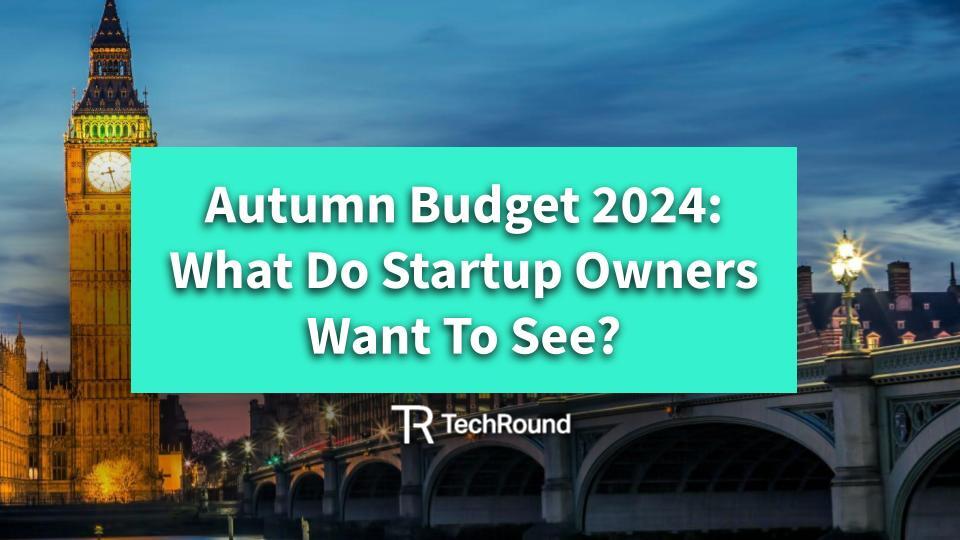With a new Labour government elected this year in the UK, all eyes are on tomorrow’s upcoming Autumn Budget.
During the announcement, Chancellor of the Exchequer Rachel Reeves will announce how the Labour government plans to plug the £22 billion ‘back hole’ in the country’s finances, all whilst accounting for pay rises in the public sector.
While the government has already announced pay raises for NHS workers, business owners all over the country will be listening closely to see how new financial policies affect them.
What Is Usually Announced In The Budget?
The Budget is announced by the Chancellor of the Exchequer and talks through the government’s plans for the coming year. Typically, the budget covers areas such as changes to taxes, funding for public services and ways the government plans to grow the economy.
For startup founders and business owners, these can have huge impacts. For example, a rise in income tax might mean that their workers see less money in their pockets, and therefore want higher salaries. Likewise, Capital Gains Tax rises could mean they face paying higher amounts for their business and investment profits.
Whilst the budget is designed to help boost the UK economy and continue growth, many will be watching closely to see how Starmer’s government plan to get the UK out of an economic slump.
In this piece, we asked founders what they are hoping to see in the autumn budget. Let’s take a look at what they said…
Our Experts:
- Marc Wren, OT Cyber Security Manager at Axians UK
- Andy Fishburn, Managing Director, Virgin StartUp
- Ryta Zasiekina, Founder of Fintech Company CONCRYT
- Tiago Veiga, CEO at Aurum Solutions
- Hannah Fitzsimons, CEO of Cashflows
- Chibeza Agley, CEO of Obrizum
- Mark Edgeworth, Founder of Shizl
- Tom Whicher, CEO and Founder of DrDoctor
- Laurent Descout, Co-founder and CEO, Neo
- Tom Leathes, CEO and Co-Founder at Motorway
- Richard Robinson, CEO at Robin AI
- Duncan Stevens, CEO of Gretel
- Volodymyr Levykin, CEO and Founder, Skyrora
- Sean Reddington, Founder & CEO, Thrive
For any questions, comments or features, please contact us directly.

Marc Wren, OT Cyber Security Manager at Axians UK
“As the Autumn Budget is about to be announced, and sophisticated cyberattacks, such as the recent TFL attack, are on the rise, substantial investment in critical national infrastructure (CNI) security is essential.
“Securing CNI is not merely a technological imperative, but a strategic necessity for the UK. By safeguarding our essential infrastructure, we protect our national security, maintain economic stability, and ensure the well-being of our population.
“The Autumn Budget must prioritise significant funding for CNI security initiatives, including talent development, research and development, and the implementation of advanced security technologies.
“This investment will not only enhance our defensive capabilities, but also position the UK as a global leader in cybersecurity.
“Now is not the time to be penny-wise with CNI.”
Andy Fishburn, Managing Director, Virgin StartUp

“The government has the opportunity to reassure the next generation of entrepreneurs that the UK is committed to helping start-ups thrive. At a time when it is increasingly challenging to secure finance via traditional routes, the Start Up Loan scheme is a lifeline for new businesses.”
The continuation of Start Up Loans is a crucial step in fostering an entrepreneurial environment in the UK and I hope the Chancellor uses the Budget to confirm the scheme will continue. Since 2013, Virgin StartUp has funded more than 6,000 founders in the UK, creating £3.30 of value for every £1 distributed in Start Up Loans.”
From the £86 million distributed, this equates to £283 million in economic value. It goes without saying that the scheme must be recognised for how much it gives back to the economy and stimulates growth; ending it now would be catastrophic.”
Ryta Zasiekina, Founder of Fintech Company CONCRYT

“With a booming tech industry and so many innovative startups, it was easy to see why in the Spring Budget, former Chancellor of the Exchequer, Jeremy Hunt, claimed the UK was “on track to become the world’s next Silicon Valley”.
“Fast-forward to the Autumn Budget statement, and we have a new Chancellor and seemingly a new set of priorities that the fintech industry is notably absent from. While it declared ambitious plans for innovation and growth, one glaring question remains: what happened to those lofty aspirations outlined in Spring?
“Only this month, a group of UK fintechs reportedly met with the government, concerned about growth limits. At that meeting, Bloomberg reported that representatives from companies including Revolut, Clearbank and Zilch warned City Minister Tulip Siddiq that Great Britain could fall behind in the fintech space if the government neglects key industry concerns.
“Despite investment in technology and fintech, the UK continues to face barriers that hinder its ability to compete with global innovation hubs. For the UK to become the next tech superpower, we need to see investment in the infrastructure required to support industry growth.
“From a lack of long-term government support to talent retention challenges, the vision of creating a thriving tech ecosystem that rivals Silicon Valley remains elusive. I question if the current strategy is enough to truly position the UK as a leader in the global technology race. If this Autumn’s statement is anything to go by, more decisive and bold action is needed to make that ‘Silicon Valley’ vision a reality.”
For any questions, comments or features, please contact us directly.

Tiago Veiga, CEO at Aurum Solutions

“Hiking the rate of capital gains tax is counterintuitive to the UK’s ambition of becoming an established global hub for technological innovation and fintech. What we need to be doing is creating an environment that enables businesses to generate wealth, and incentivise growth, not the opposite.
“[If the expected hike goes ahead] The onus will be on entrepreneurs to drive even greater growth, so they can reap the same rewards. To do so, businesses should focus on proactively finding the tools they need to scale sustainably, and this starts with enlisting time and cost-saving solutions. Technology like automation can free up an enormous amount of resources for businesses to spend on revenue-generating activities, particularly for startups who may already have limited capacity. Against a backdrop of greater tax burdens, this will be key to business prosperity in the long run.”
Hannah Fitzsimons, CEO of Cashflows
“There has been a lot of noise and speculation about what will be included in the upcoming Autumn Statement on 30th October. Some have forecasted increased corporation taxes, capital gains taxes, fuel duty, as well as employer National Insurance and many other pieces of legislation, designed to fill the £22 billion pound ‘black hole’ – the summation for the UK’s businesses is a period of ‘difficulty.’”
“However, where the government has a role to play, as an industry we also have a responsibility to do more for the business population, especially the small to medium sized enterprises (SMEs) that form the backbone of our economy. “
“We know how difficult the current economic landscape is and how important it is to help SMEs continue to thrive. Businesses must be able to access the funding they need when they need it, but inflexible repayment plans leave many unable to invest in their own growth. That’s why access to funding that allows for repayments directly aligned with sales figures provides a level of flexibility unparalleled by traditional funding, and offers a truly frictionless experience without the constraints of fixed monthly repayments.”
“Whatever is announced at the end of the month, we know the key role that payment solutions and business funding has to play for UK SMEs. I believe it’s a key enabler to help businesses not just survive but thrive.”
Chibeza Agley, CEO of Obrizum

“There is an enormous opportunity for the Government to use the Budget as a step towards consolidating the UK’s status as a world leader in AI, especially given the recent Nobel prizes won by British researchers. We encourage the Government to ensure that the UK becomes the best place in the world to run an AI company and to capitalise on the potential of AI to unlock economic growth.
“We need to be supporting education and R&D, and making it easier for people to work and live in tech hubs in London and the South East. As a growth business founded in Cambridge we see this acutely – with the lack of infrastructure being a constraint on one the UK’s most innovative cities. The announcement earlier this summer of the AI Opportunities Unit was a welcome first step, but the Budget now provides the opportunity for the Government to double down on making the UK a place where AI technology can thrive and drive growth.”
For any questions, comments or features, please contact us directly.

Mark Edgeworth, Founder of Shizl

“There’s rumours about Business Asset Disposal Relief being reduced or even removed which would be catastrophic for anyone considering launching a company, particularly using their own funds. A founder takes enormous risk, pays employer and company taxes along the journey and then is taxed again when selling a company. It’s enough to discourage entrepreneurs from taking the leap if there is increased risk through higher employment taxes ( as is also rumoured) and reduced upside if the business is successful.
“It is easy now to locate an online business or a company using remote workers in a more tax friendly country and so there is limited incentive for a UK based entrepreneur to invest in the UK whilst other countries welcome entrepreneurs with open arms.”
Tom Whicher, CEO and Founder of DrDoctor

“Wes Streeting’s recent call to arms for the NHS is fantastic in the run up to what should be a transformational Autumn Budget for our healthcare system.
“With the NHS facing ever increasing demands and budgetary challenges, investing in technology – like the proposed Patient Passport – is the best way of balancing the books and delivering a modern NHS that does justice to patients and the dedicated professionals working within it.
“Yes, that means investing in cutting edge healthcare technology to detect and cure illnesses faster and better. But it also means having vital funds available to get the basics right. Too often, our doctors and nurses are there but patients are not and 8 million appointments go unattended each year. Today, this has already cost the NHS nearly £800 million in 2024 – money that should have been spent on improving the quality of patient care and reducing the waitlist.
“But technology costs the NHS money, and there hasn’t been enough of it since the 2015 Spending Review. Now, the brakes need to be lifted. If even a small proportion of extra funds raised are earmarked for the NHS, and invested in developing the use of AI to combat Did Not Attends and optimise the use of existing resources, the opportunities are enormous.”
Laurent Descout, Co-founder and CEO, Neo

“The UK government must continue to support SMEs, which are navigating an exceptionally challenging landscape. Last year saw insolvency rates climb to their highest levels since 1993, underscoring the pressures these businesses face. For SMEs to not only survive but thrive, they need permanent full expensing, clear and stable tax policies and unhindered access to investment.
“However, the Chancellor’s proposed blanket increase in Capital Gains Tax threatens this vital investment access. It risks deterring investors from backing small, growing companies in the UK, and potentially hampers start-ups from progressing to IPOs or secondary share sales, as investor reward just won’t be there.”
For any questions, comments or features, please contact us directly.

Tom Leathes, CEO and Co-Founder at Motorway

“Entrepreneurs thrive on incentives that reward risk. But I have a real concern that the looming Autumn budget could shift the balance, impacting growth and innovation in the UK’s technology ecosystem. Speculated plans to increase Capital Gains Tax (CGT) rates or lower Business Asset Disposal Relief (BADR) will make scaling, selling, or reinvesting in new ventures significantly less attractive for many founders. Any barriers to founders starting and growing companies is going to hurt the UK in the long term.
“It’s also going to get harder for innovative tech companies to attract the talent they need to scale. As tax on businesses (and therefore employees) increases, costs to employ the best talent go up. Incentivising employees with tax efficient employee equity schemes is a powerful way to counter this, but the UK’s current startup equity plans are not good enough. We need the government to deliver policies that not only incentivise founders to get started but also help them incentivise the best talent to join them Unless the government prioritises these points, we risk talent looking elsewhere to set up shop and scale. We should be boosting UK entrepreneurial spirit, not hindering it.”
Richard Robinson, CEO at Robin AI
Duncan Stevens, CEO of Gretel

“Unlocking the £89 billion tied up in lost and dormant assets is a low-cost, high-impact opportunity for the government to support communities and drive economic growth without burdening the public purse”
“In just four years, the UK has seen a 44% increase in lost and dormant accounts, now totaling 28 million – funds that could deliver an average of £2,200 per person during the cost-of-living crisis.
“With stronger incentives for companies to participate, we could reunite millions of people with their assets, providing immediate financial relief or, when owners cannot be traced, redirecting funds to community projects in need. Unlocking these dormant assets would be a transformative move for the Chancellor to make.”
Volodymyr Levykin, CEO and Founder, Skyrora
“Greater investment into the UK space sector is a surefire way to boost both economic growth and the nation’s defence capabilities. The UK has everything it needs to control its own destiny when it comes to space but the Government must ignite the sector’s growth with action. While grants are helpful at the early stage, we need clearer strategies around longer-term financial support, in the form of patient capital and commercial contracts, to realise launch from our own shores.
“There could not be a more vital moment to prioritise support for the UK space sector. Sovereign access to space will bolster our national security and better safeguard the nation, which will be aided by the commitment to increased defence spend. Beyond this, the sector is a great enabler of technology innovation and growth within other industries. Incentivising businesses along the value chain will enable us to see the development of the right commercial environment for space, which will foster job creation across the UK.”
Sean Reddington, Founder & CEO, Thrive
“As the Autumn Budget approaches, many of us in the startup space are looking for meaningful support for the UK’s entrepreneurs and small businesses, particularly in the face of tax increases. Early-stage companies operate on tight margins where every penny counts, and a high-tax environment can discourage aspiring entrepreneurs, especially those bootstrapping without external funding.
“The right incentives could make a huge difference for founders just starting out. For example, it would be great to see the government introduce more favourable dividend options, so entrepreneurs who sacrifice their salary to fuel growth could reap the benefits of better rewards when their businesses become profitable. Measures like tax-free periods or enhanced incentives would be beneficial given the alarmingly high failure rate of new businesses. Clearer and more timely communication of the new tax changes would also greatly benefit business owners.
“For entrepreneurs, the risks are already high. Startups play a crucial role in powering economic growth, and it’s essential the government fosters an environment that makes entrepreneurship an achievable dream for all. Supporting long-term growth over short-term gain would go a long way in ensuring that UK businesses, both small and large, can flourish.”
For any questions, comments or features, please contact us directly.








